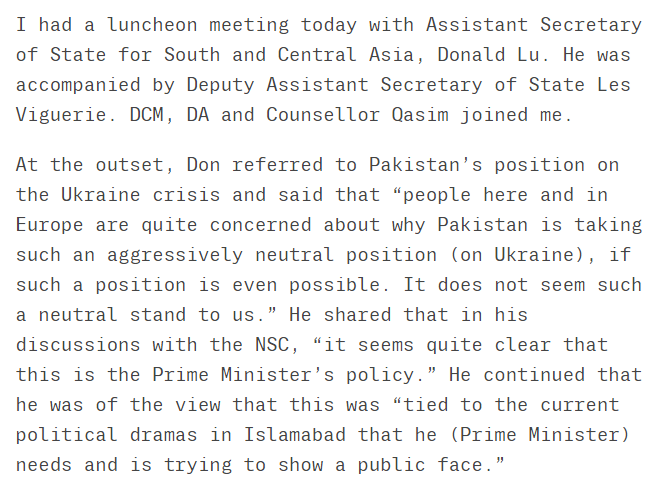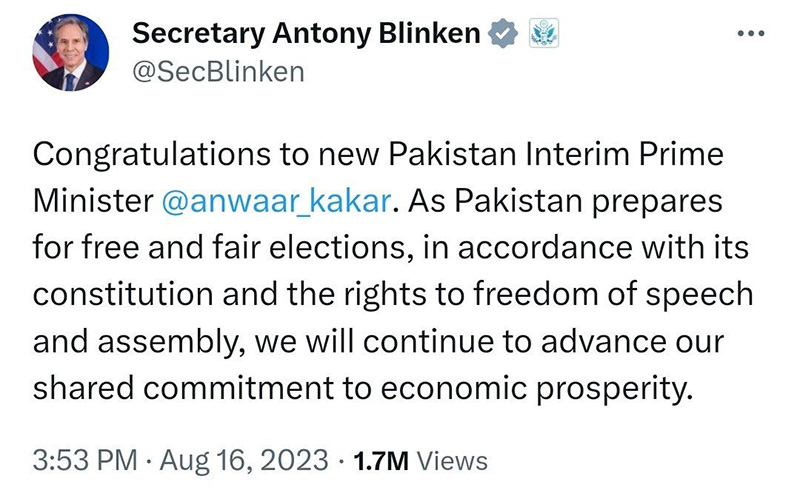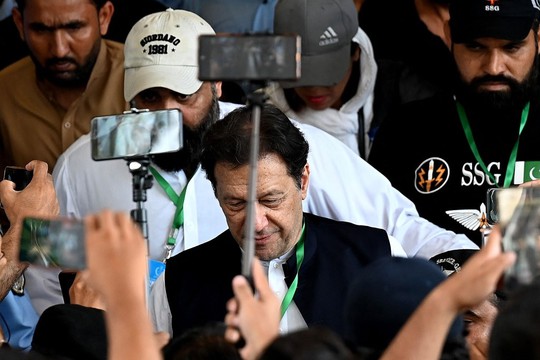Pakistan’s former Prime Minister Imran Khan leaves after appearing at the Supreme Court in Islamabad on July 26, 2023.
Photo: AFP
The United States once again carried out an operation to change power in a foreign state. Documents show how it happened in Pakistan in 2022. The U.S. State Department encouraged the Pakistani government in a March 7, 2022, meeting to remove Imran Khan as prime minister over his neutrality on the Russian invasion of Ukraine, according to a classified Pakistani government document obtained by The Intercept.
The political struggle escalated on August 5 when Khan was sentenced to three years in prison on ‘corruption charges’ and taken into custody for the second time since his ouster. Khan’s defenders dismiss the charges as baseless. The sentence also blocks Khan, Pakistan’s most popular politician, from contesting elections expected in Pakistan later this year.
One month after the meeting with U.S. officials documented in the leaked Pakistani government document, a no-confidence vote was held in Parliament, leading to Khan’s removal from power.
The vote is believed to have been organized with the backing of Pakistan’s powerful military. Since that time, Khan and his supporters have been engaged in a struggle with the military and its civilian allies, whom Khan claims engineered his removal from power at the request of the U.S.
The text of the Pakistani cable, produced from the meeting by the ambassador and transmitted to Pakistan, has not previously been published. The cable, known internally as a “cypher,” reveals both the carrots and the sticks that the State Department deployed in its push against Khan, promising warmer relations if Khan was removed, and isolation if he was not.
The document, labeled “Secret,” includes an account of the meeting between State Department officials, including Assistant Secretary of State for the Bureau of South and Central Asian Affairs Donald Lu, and Asad Majeed Khan, who at the time was Pakistan’s ambassador to the U.S.
March 7, 2022 Pakistani Diplomatic Cypher (first page transcription):

The document was provided to The Intercept by an anonymous source in the Pakistani military who said that they had no ties to Imran Khan or Khan’s party.
The dynamics of the relationship between Pakistan and the U.S. described in the cable were subsequently borne out by events. In the cable, the U.S. objects to Khan’s foreign policy on the Ukraine war. Those positions were quickly reversed after his removal, which was followed, as promised in the meeting, by a warming between the U.S. and Pakistan.
In the meeting, according to the document, Lu spoke in forthright terms about Washington’s displeasure with Pakistan’s stance in the conflict. The document quotes Lu saying that “people here and in Europe are quite concerned about why Pakistan is taking such an aggressively neutral position (on Ukraine), if such a position is even possible. It does not seem such a neutral stand to us.” Lu added that he had held internal discussions with the U.S. National Security Council and that “it seems quite clear that this is the Prime Minister’s policy.”
Lu then bluntly raises the issue of a no-confidence vote: “I think if the no-confidence vote against the Prime Minister succeeds, all will be forgiven in Washington because the Russia visit (in February 2022) is being looked at as a decision by the Prime Minister,” Lu said, according to the document. “Otherwise,” he continued, “I think it will be tough going ahead.”
Lu warned that if the situation wasn’t resolved, Pakistan would be marginalized by its Western allies. “I cannot tell how this will be seen by Europe but I suspect their reaction will be similar,” Lu said, adding that Khan could face “isolation” by Europe and the U.S. should he remain in office.
The discussion concluded, according to the document, with the Pakistani ambassador expressing his hope that the issue of the Russia-Ukraine war would not “impact our bilateral ties.” Lu told him that the damage was real but not fatal, and with Khan gone, the relationship could go back to normal.
Khan’s removal from power after falling out with the Pakistani military, the same institution believed to have engineered his political rise, has thrown the nation of 230 million into political and economic turmoil. Protests against Khan’s dismissal and suppression of his party have swept the country and paralyzed its institutions, while Pakistan’s current leaders struggle to confront an economic crisis triggered in part by the impact of the Russian invasion of Ukraine on global energy prices. The present chaos has resulted in staggering rates of inflation and capital flight from the country.

read more in our Telegram-channel https://t.me/The_International_Affairs

 10:35 20.08.2023 •
10:35 20.08.2023 •























